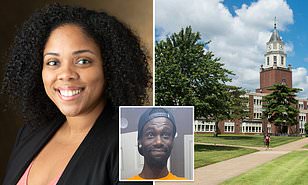A Southern Illinois University professor in her advocates for ‘black bereavement leave’ has argued that black workers should get paid time off when someone in the black community is tragically killed, even if they have no direct connection to them.
Dr Angel Jones said she recently burst into tears when she had to email her students in the wake of Tyre Nichols’ death – who was beaten to death in Memphis, allegedly at the hands of five black cops.

She claims it was impossible to ignore her own feelings, and that she had cried ‘numerous times’ sending similar emails in the past.
Writing in an opinion piece for Times Higher Education, Dr Jones said: ‘Although it is customary for employees to receive support and understanding while grieving the loss of a loved one, the same care is rarely shown to the Black community when we lose someone in horrific and traumatic ways.
‘Where’s our Black bereavement leave?’
The professor added that it is Black educators who have to ‘exert additional emotional energy’ and pick up the slack after institutions send an ‘obligatory, and often performative, statement to the campus community.’
Nicole Joseph and Hasina Mohyuddin, both deans at Vanderbilt University have been slammed for their lack of effort and sensitivity addressing the shooting – in which Anthony Dwayne McRae killed three students at MSU campus.
The dean’s used a self-automating ChatGPT to write a 297-word email to students about deadly mass shooting at Michigan State.
Dr Jones claims that Black people’s pain is not recognized, staff are not given counselling, and she questioned where the grace was if black teachers miss a deadline after something traumatic happens to a black person in the news.
She continued: ‘Some may have thought I was joking when I mentioned Black bereavement leave, but I wasn’t.
‘We need space and time to grieve without having to explain or defend it. And since the grief process, like the Black community, is not a monolith, flexibility is required.’
Dr Jones’ field of study is the impact of racism on the mental health of black students at historically white institutions – and one of her most recent works was about how black graduates respond to and cope with gendered-racial microaggression.

